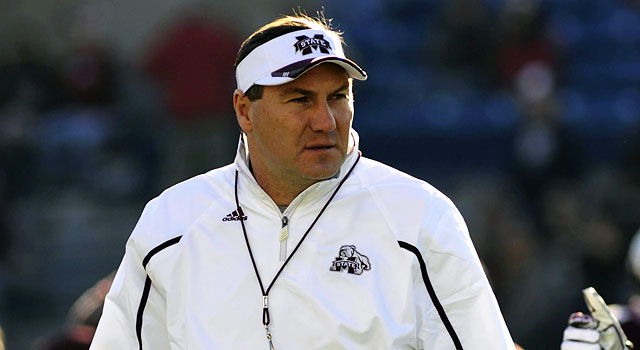Hinnen: Is Mullen's eligibility idea a good one?
 Dan Mullen believes the NCAA’s new eligibility standards need some tweaking. (USATSI)
Dan Mullen believes the NCAA’s new eligibility standards need some tweaking. (USATSI)Dan Mullen admitted to al.com on Tuesday that he does not (as of yet) have any support for his proposal that would dramatically alter the college football eligibility landscape. But it’s likely to kickstart some spirited discussion all the same — and while far from perfect, his argument that players who excel academically deserve greater rewards is one that merits it.
Mullen currently isn’t happy with the NCAA’s new academic standards, which starting in August 2016 will require first-year student-athletes to graduate high school with a 2.3 GPA to receive freshman eligibility. Players who pass the NCAA’s qualification standards but fall short of the benchmark will be forced to take an academic redshirt.
“I think it’s a tough approach [for those players] because you come in, and you know already you can’t play,” he says. “It messes with academics and other things. It messes with your mindset a little bit.”
Mullen’s also unhappy that with larger numbers of players unable to play as freshmen, those who are immediately eligible will be forced into active roles with their teams … whether they’re ready for those roles or not.
His counter-proposal: allow those players who enroll with the 2.3 GPA or better to have five years of eligibility rather than four, so there’s no lasting damage from being rushed onto the field in what should, he argues, have been a redshirt season.
“Why punish someone who might be forced to have to play?” he told al.com. “Instead of punishing guys for doing bad, why not reward guys for doing good?”
Mullen’s argument has major issues, but that second question is one neither the current NCAA standards nor the new ones installed for next fall answer: why not offer more incentives for high school athletes to push themselves in the classroom, not just to competency, but to distinction? Why not reward high academic achievers with something more than, you know, freshman eligibility — which they’ve already enjoyed since 1972?
Despite Mullen’s complaint, the NCAA’s move to raise the bar from the current standard is a good one; let’s just say that Mullen’s idea that removing Saturday football as a distraction could hurt the academics of student-athletes freshly tossed in the college coursework deep end is a new one.
If early projections of academic redshirt rates as high as 40 percent of incoming classes are accurate, Mullen might have a point about too many players being forced to play as freshmen, but that remains to be seen — and it’s safe to say most players won’t complain a bit about getting to see the field immediately, whether physically prepared or not.
So, yes, Mullen’s fears are likely overstated, and his solution — to grant a clear cut majority of FBS players a fifth year of eligibility just for clearing the 2.3 GPA bar — both doesn’t reward true academic achievement and looks to be the sort of sweeping, radical change that would never have a prayer of being put into action. But an extra year of eligibility combined with immediate freshman availability is a worthwhile carrot to offer, one that could become a legitimate academic incentive for players and coaches alike — the former to make the best grades possible, the latter to recruit the better student whenever possible.
So let’s say the NCAA keeps the academic redshirt for qualifiers under the 2.3 mark, keeps the five-years-to-play-four clock for most qualifiers above it, but also allows Mullen’s fifth year for incoming freshmen with, say, a 2.8 or 3.1 — wherever the cutoff would be for the top five-to-10 percent of a class. The upside for the NCAA to offer real, tangible rewards for academic achievement (at a time when college football curiously seems to be trying to punish players who take their studies seriously) is obvious.
And the downside is … what, exactly? Another year’s worth of the NCAA’s brightest student-athletes actually living up to that label? Yeah, that sounds terrible.
This entry passed through the Full-Text RSS service – if this is your content and you’re reading it on someone else’s site, please read the FAQ at fivefilters.org/content-only/faq.php#publishers.